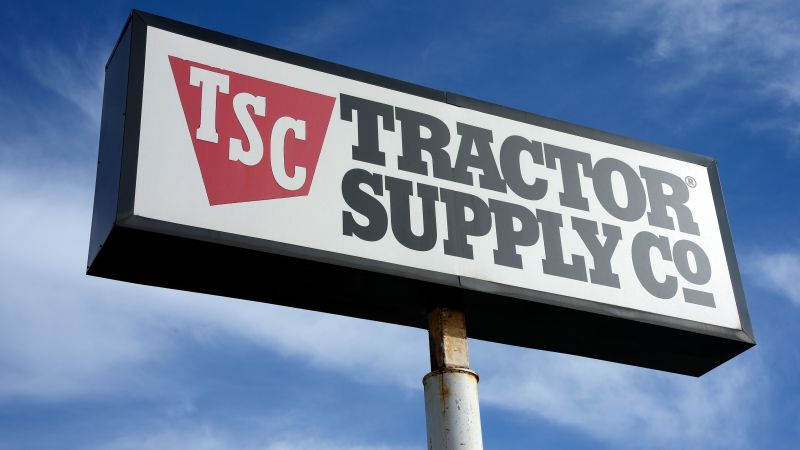New York
CNN
—
Tractor Supply Company has eliminated its diversity, equity and inclusion initiatives as part of what the retail chain says is a push to distance itself from “nonbusiness activities” after conservative backlash from some of its customer base.
In a news release Thursday, Tractor Supply, which advertises itself as the country’s “largest rural lifestyle retailer,” said it will stop sponsoring activities like “pride festivals and voting campaigns” and would be cutting DEI roles and “retire (its) current DEI goals while still ensuring a respectful environment.”
“We have heard from customers that we have disappointed them,” the company said. “We have taken this feedback to heart.”
The about-face comes less than a month after right-wing commentator Robby Starbuck attacked the company’s LGBTQ-inclusive stance and DEI hiring initiatives in a series of posts on X. Starbuck, who in 2022 launched a failed bid for Tennessee’s 5th Congressional District, called on customers to boycott Tractor Supply and contact its corporate leadership.
After the policy pivot was announced, Starbuck took to X again, calling the move a “massive victory” and “the single biggest boycott win of our lifetime.”
Shaun Harper, a professor of business, public policy and education at the University of Southern California, told CNN one reason for the conservative backlash was the fact Tractor Supply failed to tailor its DEI policy to the culture in which it operates.
The Brentwood, Tennessee-based company, which bills itself as the largest supporter of the National FFA Organization, a non-profit supporting agricultural education, has deep ties to rural communities across 49 states. Harper says Tractor Supply’s inclusion policies should have been attuned to that specific cultural context.
“You can’t say you’re going to try to do at Tractor Supply what they do at the Apple headquarters in Cupertino, California — that’s definitely not going to work,” he said. “It’s what I call ‘situated DEI.’ I would say start with an emphasis on expanding opportunities for low income people, expanding access to farming for women in rural contexts, and helping people understand how more women and more people of color in the farming industry benefits everyone. And helping them understand that the diversification of the farming industry, with women and people of color doesn’t necessarily have to entail a reduction and opportunities for White male farmers.”
Still, activists and experts say Tractor Supply’s backtrack is a blow against civil rights and LGBTQ+ protections for employees and customers.
“Homophobia, transphobia, sexism, gender discrimination, workplace sexual harassment, ableism, size-ism and racism are not going to eliminate themselves,” said Harper. “In the absence of good policy and programs within companies, the danger is that those long-standing problems are going to become exacerbated. There’s going to be more conflict between and among employees, and customers who represent various diverse groups.”
Tractor Supply also said it would “no longer submit data to the Human Rights Campaign,” one of the biggest LGBTQ+ non-profit advocacy groups in the United States.
It was one of more than 1,300 businesses to participate in the HRC’s Corporate Equality Index, a benchmarking survey and report measuring policies and practices relating to LGBTQ+ workplace equality. In 2023, the company earned a near-perfect score of 95/100 for instating workplace protections and benefits taking LGBTQ+ employees into account, providing inclusivity training to workers, and performing outreach to the LGBTQ+ community.
“Tractor Supply Co is turning its back on their own neighbors with this shortsighted decision,” Eric Bloem, vice president of Programs and Corporate Advocacy at the Human Rights Campaign, told CNN in a statement Saturday. “LGBTQ+ people live in every zip code in this country, including rural communities. We are shoppers, farmers, veterans and agriculture students. Companies from every industry work closely with us to be sure their employees and customers are respected, valued and can get the job done for their workforce and shareholders. This is why the Tractor Supply — and most of the country’s biggest employers — have worked with us for years to create inclusive policies and practices. Caving to far right extremists is only going to hurt the same folks that these businesses rely on.”
The policy reversal is part of a wider trend of corporate vacillation over LGBTQ+ inclusion. In the face of anti-LGBTQ backlash threatening companies’ bottom line, several household brands have backed down in their support of inclusivity.
Last year, Bud Light’s partnership with transgender influencer Dylan Mulvaney sparked an anti-trans backlash and a monthslong boycott of the beer brand, throughout which the company failed to take a firm stance in support of Mulvaney and the transgender community. The boycott and the subsequent tepid response lost parent company Anheuser-Busch InBev as much as $1.4 billion in sales, as well as its credibility with a major LGBTQ+ non-profit.
Last month, retailer Target said it will limit how many stores would carry its Pride-themed collection for adults after a boycott from right-wing activists last summer led to a sharp dip in sales.
While bowing to consumer backlash might seem like the safest strategy to claw back revenue lost in a boycott, it can also be shortsighted. Harper argues few companies consider the potential cost of litigation from customers and employees.
“So much money gets wasted on settlements or damages for discrimination and harassment,” he said. “I want companies to not just think about sales, but also about the cost of litigation, as well as the reputational costs. Those are the parts that business leaders aren’t thinking about as they are folding on DEI.”








:max_bytes(150000):strip_icc()/roundup-writereditor-loved-deals-tout-f5de51f85de145b2b1eb99cdb7b6cb84.jpg)


